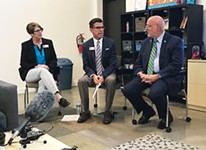New Housing Rules Benefit Project Transitions
Affordability Unlocked helps the AIDS services organization triple its housing stock
By Sarah Marloff, Fri., Nov. 29, 2019
Affordability Unlocked is already having a positive effect on Austinites. Project Transitions, local provider of affordable housing and wraparound services to people living with HIV/AIDS, will nearly triple its housing stock within the next two years thanks to the city ordinance that City Council put on the books in May.
The organization, which began in 1989 as a hospice care provider for folks dying from AIDS-related complications, currently runs Doug's House – a five-bed hospice and recuperative care space – along with two supportive housing communities: the 22-unit Roosevelt Gardens, purchased in 1995, and the eight-unit Highland Terrace, purchased in 1998. As soon as April, however, Roosevelt Gardens will be torn down and rebuilt as a larger, more modern building with an additional 18 housing units.
Several months later, PT plans to break ground at 8007 Burnet Road. The new building project – designed by Michael Hsu Office of Architecture – will include 61 new affordable units, as well as an indoor/outdoor space and a telehealth center. Project Transitions Executive Director Cynthia Herrera says the expansion will "contribute to bringing more people from homelessness to housed." As she told the Chronicle hours before PT's clients celebrated Thanksgiving a few days early, PT helps the "most medically vulnerable homeless in the city."
Since its founding, Project Transitions has served Austinites living with HIV/AIDS who have no place to turn and – quite literally – no place to live. As Madge Whistler, PT's financial and operations manager, explained, PT was a place for people living with AIDS to "die with dignity." It's why the apartment complexes were purchased in the Nineties: "So people had somewhere to live before they went to Doug's House to die." Today, Whistler said, their system flows in the opposite direction. According to 2018 statistics, 96% of their clients were homeless or marginally housed before connecting with Project Transitions – many started their journey at Doug's House for what they call "recuperative care" before moving into the supportive housing spaces.
Without housing, said Director of Client Services Todd Logan, "staying in HIV medical care and taking your medications is impossible." Once in housing, clients are met with a bevy of services including on-site case management, a community center with a commercial kitchen and free breakfast every weekday, a food pantry, and life skills programs to prepare clients to move into regular housing within three to five years. (Resident-clients are also allowed to bring their dogs with them into housing.)
Housing unsheltered folks living with HIV is crucial for both the individual and the larger community – getting into care and staying on medication is how folks lower their viral load so they can no longer transmit the disease to others. This brings down the "community viral load" to help Austin achieve its goal of zero new HIV transmissions by 2030 – no small task considering the rate of new infections in the Austin-area has stayed more or less the same since 2010, with roughly 288 people diagnosed with new HIV infections yearly.
With an 18-month waitlist for housing, Logan said, expanding PT's capacity has been the organization's central push for years. At its current capacity, Logan added: "We have not been able to meet the tidal wave of need that's out there." (PT believes there are roughly 500 Austinites living with HIV who need housing.) And "if we had to rebuild under existing zoning," said Whistler, "we wouldn't even have had 22 units."
And then Council passed Affordability Unlocked, relaxing existing site standards to make it easier for developers to create more units in affordable and mixed-income projects – regardless of their location – for low- and moderate-income residents. Project Transitions qualified for Type Two incentives, allowing them to increase the height and number of units on the Roosevelt Gardens lots. The Burnet project also benefited from the ordinance. It, too, when it opens for business, will meet two of the Type Two prerequisites (only one is required): At least 75% of units will be affordable, and 10% of the affordable units will serve households at 30% median family income or below.
During construction, PT will continue to house current Roosevelt Gardens residents, with the goal of keeping "them out of their new home for the least amount of time possible," said Herrera. The organization is currently scouting for temporary housing and working to keep the community together. The supportive services PT offers will also continue to be available.
Those services will only be improved once construction wraps on each project. The new Roosevelt Gardens will include 6,000 square feet devoted to supportive services; Herrera says PT is currently setting up partnerships with local mental health and health care providers to work on-site both there and on Burnet. "We're doing something that I think only a handful of others are doing across the country," said Herrera. "It's transformative, because we are creating a sense of community, we're creating support, and an environment for people to thrive. ... That's what makes us special – we're going to be there for them wherever they are on their journey to where they want to be."
Got something to say on the subject? Send a letter to the editor.













